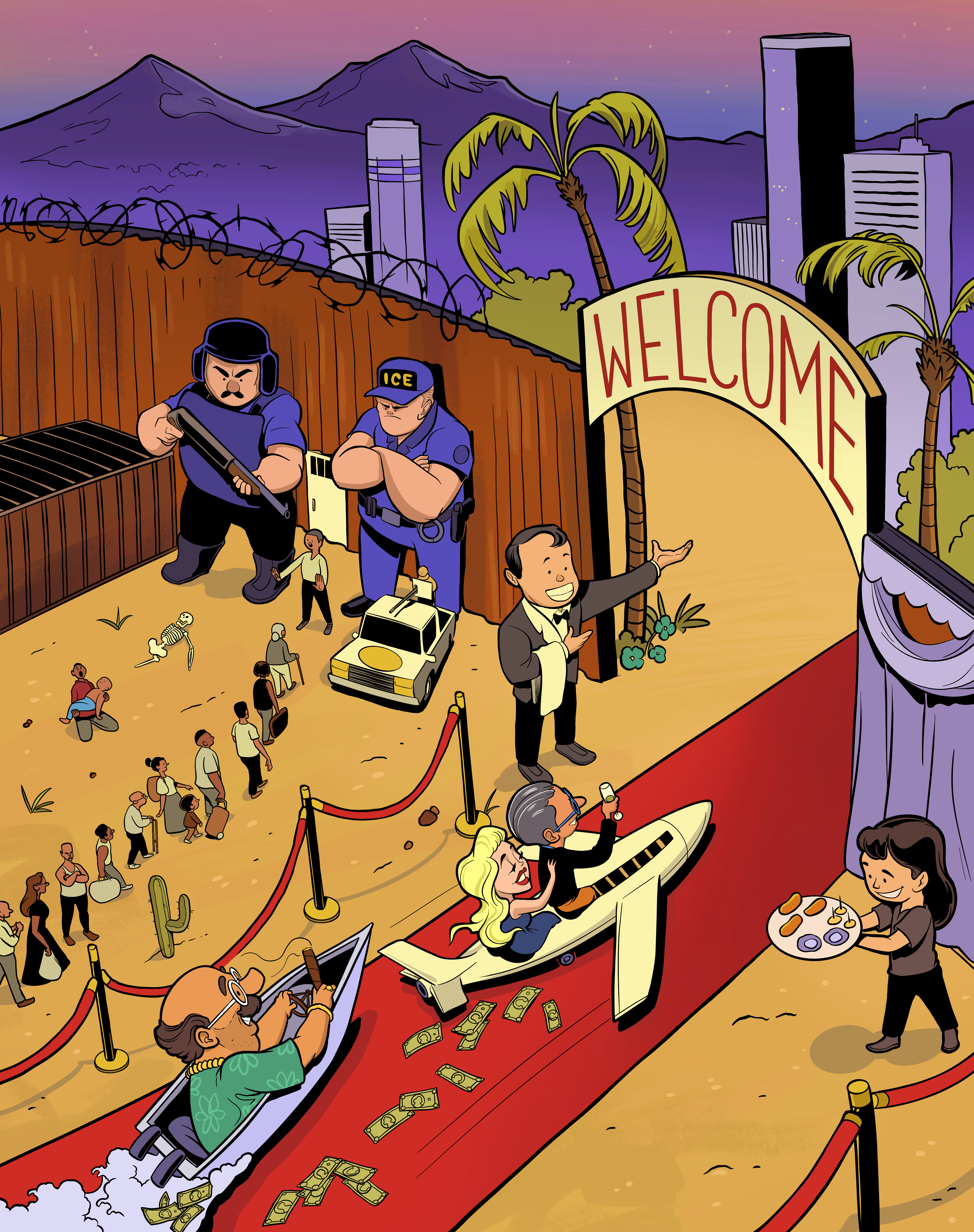
Velvet Ropes and Poor Doors
Migrant caravans vs. passports for the rich. Open borders are less threatening when the world’s citizens have at least rough economic equality.
The movement of people across borders has endured as a divisive political issue in rich nations. First, there’s the West’s xenophobia and paranoid fear of migrant violence, whether it be of Salvadoran MS-13 gang members or Islamic State sleeper cells. Then there are the very real economic anxieties faced by the local working class, the people whose jobs the migrants are coming to take, so the politicians tell us. The political Right remains eager to exploit this issue to break working-class solidarity, encouraging struggling workers to see their economic problems as not caused by the landlords raising their rent or the employers cutting their health insurance but instead by fellow struggling workers from other countries who happen to be seeking refuge from oppressive conditions.
Whether in the U.S., Australia, the U.K., or European Union, the fear of migrants has one consistent feature: it is hysterically focused on poor, “illegal” migrants. Those entering legally are subject to far, far less interest, even though this group includes some who, cynically exploiting national residency loopholes and visa-to-passport gateways, do not actually wish to work hard and contribute to the country. People who are effectively buying their way into residency.
The rich, in other words. Their ability to collect safes full of visas, passports, and residency documents for their awful ruling class families draws a hell of a contrast with desperate peso-less Central American families dealing with corrupt border guards, drug cartels, fanatical right-wing opposition, and the need to keep their kids from falling off the top of freight trains. When the wealth-hoarders wish to move around, their money props them up through frictionless golden corridors to their destination. The poor, on the other hand, must go through the gates of hell in search of a better life.

Blood and Soil and TV
For unfortunate sub-millionaires, extralegal migration isn’t just inconvenient, uncomfortable, or unpleasant. It will fucking kill you. Corrupt border guards, leaky ships, steamy jungles, cartel-linked migrant smugglers—there is no end to the heinous ungodly trials faced by extralegal migrants, the people at the very, very bottom rung of our twisted hierarchical global society.
While most informal migrants to the U.S., for example, take the same buses as the broad working class, the really poor ones bear the mark of the Beast. La Bestia is the nickname given to a large, dangerous freight train running from southern Mexico to the U.S.-Mexico border. Blazing hot by day and freezing cold at night, the train transfers desperate people who have hitched unsanctioned rides on the godforsaken thing, putting them at tremendous risk as they ride long stretches on rough rails, which results in numerous unfortunate travelers falling off and losing their limbs or lives. These are the real results of “strong foreign policy”—our military interventions and electoral meddling in Central and South American countries cause poverty and social decline, forcing peso-less families to confront the extreme danger of secretly riding freight trains. Our “strong on the border” policies have also resulted in established routes of travel being cut off, thus necessitating treacherous jungle travel by migrants crossing the Darién Gap from South America to Central America. Then, migrants face the added burden of hiding from Mexican cops and train security, with whole families riding a screeching industrial machine, a sad incongruity of scarred, rough freight cars carrying small, precious children hopping on and off.
In response to millions of truly hair-raising migration horror stories, the developed world has slammed its doors in the face of people whose living conditions have been made dangerous and dismal in the first place mainly because of policy decisions made in developed-world capitals. To the U.S. and Europe, the endless suffering of extralegal migrants is something you watch on TV, to like or dislike, but which affects other people far away. Liberals (and leftists), we should recall, spent years condemning the Trump administration’s cruel, notoriously ugly immigration policies, like separating children from parents and routinely denying clearly-justifiable asylum cases. But when his wildly ill-conceived reelection campaign was eating shit in the polls, President Joe Biden did a full one-eighty and returned to the Trump policy of expelling potential asylum claimants—with indeed the same emergency-based rationalization. Once 2,500 migrants have claimed asylum each day, asylum rights are considered suspended. Further, border agents are no longer required to ask migrants if they fear for their safety in their home country, a crucial requirement for an asylum claim. Instead, migrants must now raise the issue themselves. Further, migrants caught attempting to enter the U.S. without legal sanction, even if doing so through a legal point of entry, are banned from the country for five years.
The European Union, for its part, has experienced its own extralegal migration primarily via the maritime smuggling of people. Cruel traffickers pack the desperate travelers onto rickety, overcrowded, often unseaworthy craft that fail to reach their developed-world destinations. The EU, despite being known as relatively generous toward its citizens through its extensive welfare states (which have managed to survive years of austerity and privatizations), is capable of being perfectly punitive and cruel to these luckless maritime travelers.
In order to thwart the arrival of desperate people who could actually help with these countries’ labor crises, Europeans use a number of ugly practices. One is sanctioning charitable aid and rescue groups that attempt to rescue migrants (when they ought to be rescued by European and African coast guards). For example, Italy has put restrictions on search and rescue ships that the humanitarian group Médecins Sans Frontières has called a “dirty political tactic to prevent people arriving on European shores at all costs.” Another is to close their ports to rescue ships, as Italy’s right-wing government has done. In a move more outwardly evil, European governments and the EU have been paying off hideous North African regimes to interdict voyages, sending hundreds of millions of euros to Tunisia, Morocco, and other African states to viciously repress migrant-looking groups, especially Black Africans. Those caught on boats in the Mediterranean may be detained or driven inland and “dumped” in the Sahara Desert, left to walk for days back to civilization without water or supplies, as the Washington Post and others have reported.
Even more notoriously, the Greek Coast Guard has been caught watching—and withholding aid—as sinking ships carrying hundreds of souls very gradually submerge. They do this either deliberately as a discouragement or by waiting too long until ships sink or capsize. In some instances, authorities have outright abandoned migrants at sea, as in an infamous case involving the Greek coast guard.
The Wikipedia list of such incidents is extremely long and blood-curdling and of course represents only the small fraction of such incidents that earn media reports. With so many desperate people crowded onto tiny boats in the Mediterranean, strange moments can occur, as when the $175 million superyacht Mayan Queen IV happened to be in the vicinity of a giant barge full of humans that was capsizing off the coast of Greece. Normally populated by pampered billionaires and anchored off Monaco and Italy, the yacht, after a hasty rescue mission, was suddenly filled with dozens of soaked and traumatized people from Syria, Palestine, Egypt, and Pakistan. The New York Times dryly wrote, “The incongruous image of the devastated survivors disembarking the Mayan Queen on a port in Kalamata last week underlined what has become the strange reality of the modern Mediterranean, where the superyachts of the superrich, equipped with swimming pools, Jacuzzis, helipads and other trappings of luxury, share the seas with the most destitute on smuggler-operated boats perilously crossing from northern Africa to Europe.”
Passportfolio
While the truly elite have always coveted global mobility as a hedge against adverse events—from coups to wars to government upheavals to the long-hated income tax—the most enriched capitalists, whose wealth mainly relies on passive income from assets in their investment portfolio, now find themselves needing to expand and diversify their portfolio of visas and passports.
Consider what could be called today’s visa and passport market. Today, fourteen countries offer visas or passports to those making a qualifying real estate investment. Many more countries, including the U.S. and most of the EU, offer residence visas for non-property investors, which can often lead to a passport over time. A number of smaller states, plus Turkey, will directly issue passports to property buyers regardless of residence. The New York Times notes, “The picky passport shopper needs to consider price, each country’s tax system and the speed of its bureaucracy: Dominica is the fastest to hand over a passport, and Turkey the slowest among nations that go straight to a passport. [...] Wealthy Chinese [people] are by far the biggest buyers of both visas and passports, followed by Russians, experts say. There is also growing interest among French citizens eager to avoid high income taxes and Britons desperate to maintain their European Union membership...” A consultant cited in the article estimates that among Ultra-High-Net-Worth Individuals (UHNWIs—those with assets over $30 million), 36 percent have a second passport.
Investment consultants and money managers are happy to help their clientele with the details. Consider the Spanish "golden visa," an attractive option that offered a quick path to legal residency and potentially full Spanish citizenship. A major side benefit was legal access to the full Schengen Area, a union composed of 29 European states (including most of the European Union) that allows visa-free travel across the continent. The golden visa was obtained through a number of routes, including a qualifying 500,000 euro real estate investment, a million-euro Spanish bank deposit, or an equivalent investment in Spanish companies. In an indication of the market we’re talking about, a consultancy advises: “Applicants must demonstrate they have sufficient funds to support themselves without the need to work.”
The Spanish visa was quite successful at attracting the global wealthy, bringing in billions of euros from Russians, post-Brexit English, and especially wealthy Chinese people. So much so, in fact, that it helped drive up Spanish housing prices, and Spain decided to kill the program this year. Portugal also recently changed its golden visa rules to exempt real estate to ease the pressure, while Ireland killed its program. The Greeks merely raised their investment threshold.
Of course, many countries have broadly similar programs, like the Green Card in the U.S. Everyone knows that people overseas may apply for this legal resident status if they have family in the country who sponsor them or a sponsoring employer. But investors committing cash above certain thresholds may apply as well, with the numbers varying by investment type but usually being over $1 million. The EU has similar programs. Of course, for smaller, poorer countries, prices are more economical. For example, you can become a citizen of Vanuatu, the tiny Pacific island state, for as little as $130,000.
It's a picture of incredible ease, not just for entry into a country’s physical territory but for fully legally-sanctioned entry, with nice clear rules for residence and a grateful reception as developed countries are eager to thank the rich for their growth-boosting investments. Comparing these perks with the staggering cruelty, hardship, and ugliness that poor extralegal migrants are subjected to, you can argue that the migration system has a class-based set of tiers, and the conditions for “illegals” are reminiscent of “poor doors.”
In recent years, some liberal cities like New York and London have required developers to include among their mega-ritzy luxury developments some affordable units for normal people, in order to help people cope with the housing shortages wracking urban markets. Developers obliged and grudgingly built some middle-class-type units within new buildings of otherwise mostly high-end models but included separate entrances for tenants of the more affordable units, which became known as “poor doors.” The Guardian described a main entrance as “luxury marble tiling and plush sofas, and a sign on the door alert[ing] residents to the fact that the concierge is available. Round the back, the entrance to the affordable homes is a cream corridor, decorated only with grey mail boxes and a poster warning tenants that they are on CCTV and will be prosecuted if they cause any damage.” An agent flatly added that the separate doors are “so the two social strata don’t have to meet.”
With penniless, traumatized, exhausted parents and children languishing in Mexican border towns for years on end while stinking-rich inheritors are gliding overhead in private jets to their vacation homes in countries where they hold a purchased visa, one comes to see that our border crossings are simply poor doors for many countries.
Gulfstream and the Beast
The Left has sometimes argued for open borders, where national frontiers still exist but are mostly porous to the movement of people and goods. The Right has eagerly jumped on the idea to beat the Left with claims that we want to allow violent foreign gang members to rampage freely, while the Left can point to conservatives’ own alleged views promoting freedom of commerce: the unhampered flow of goods, people, and ideas they claim markets are perfect for. Clearly, the Right has been very effective in freeing gigantic global firms from limitations so that they can import and export stunning volumes of goods and sponsor real volumes of skilled workers.
But for all this controversy, in much of the world, open borders already exist. They exist for the truly wealthy, who are easily in a position to make the investments and hire staff to keep track of the timelines and paperwork. For the ruling class, border guards are less likely to lock up your kids than open the velvet ropes for you, and the towering dystopian edifice of today’s rising border walls look like revolving doors to your next global shopping excursion.
Open borders are less threatening when the world’s citizens have at least rough economic equality, rather than a gigantic global mass of desperate poor giving the northern middle classes anxiety, to the advantage of the ruling rich elite. The stupendous trillions of dollars of global wealth hoarded by the rich could readily be shared with the working majority and used to uplift the lives of people in the developed and developing world. With socialism, equality of dignity would give everyone a passport to a far better world.






